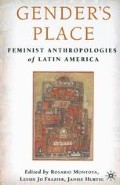Abstract
My field notes remind me that it was a Wednesday morning in March of 1992, six months into the school year and nine months into my ethnographic research in the Venezuelan town of Timotes.1 I left the house early and joined the flow of students as they headed to the first-period class at Liceo Parra,2 the municipal secondary school. Each student sporting the requisite national uniform—blue jeans and beige or white shirts depending on their grade, blue sweaters on chilly Andean days—they created a nearly monochrome stream of disciplined informality that briefly transformed the otherwise motley, sparsely inhabited, and principally adult space of the street. I was looking forward to attending the first class that day. Profesora Nilda Martínez,3 the serious, soft-spoken young ninth-grade language and literature teacher, was holding a “debate” (debate in Spanish) on “the role of Venezuelan women in society,” and she was expecting me to attend.
Spatial practices in fact secretly structure the determining conditions of social life.
—Michel de Certeau, The Practice of Everyday Life
Access this chapter
Tax calculation will be finalised at checkout
Purchases are for personal use only
Preview
Unable to display preview. Download preview PDF.
References
Bisseret, Noëlle. 1979. Education, Class Language and Ideology. London: Routledge and Kegan Paul.
CERPE. 1982. El sistema educativo en el proceso de modernization de Venezuela. Colección CERPE no. 3.
De Certeau, Michel. 1984. The Practice of Everyday Life. Trans. Steven Randell. Berkeley: University of California Press.
Domínguez, Freddy and Napoleón Franceschi. 1988. Trabajos prácticos de historia de Venezuela contemporánea. Caracas: Colegial Bolivariana, C.A.
El National. 1991. “Cuando las madrés son también padres.” May 14.
Espinoza Marín, Jesús María. 1992. Historia mínima de Timotes. Timotes-Mérida, Venezuela: Centra Editorial Escuela de Comunicadores Populares “Mario Kaplún.”
Franceschi, Napoleón and Freddy Domínguez. 1988. Historia de Venezuela. Octavo Grado. Caracas: Colegial Bolivariana, C.A.
Gill, Lesley. 1997. “Creating Citizens, Making Men: The Military and Masculinity in Bolivia.” Cultural Anthropology 12(4): 527–550.
Hernández, Eumelia. 1985. Una Vida Una Lucha. Caracas: Fundación para el desarrollo social de la región capital.
Hurtig, Janise. 1998a. “Gender Lessons: Schooling and the Reproduction of Patriarchy in a Venezuelan Town.” Ph.D. diss., University of Michigan.
Hurtig, Janise. 1998b. “Myths of (fe)male achievement.” La Educatión, Interamerican Review of ‘Educational Development 42: 101–120.
Kandiyoti, Deniz. 1991. “Bargaining with patriarchy.” In The Social Construction of Gender, edited by Judith Lorber and Susan Farrell. London: Sage Publications.
Lave, Jean. 1993. “The practice of learning.” In Understanding Practice: Perspectives on Activity and Context, edited by Seth Chaiklin and Jean Lave. Cambridge: Cambridge University Press.
Levinson, Bradley. 2001. We are all Equal: Student Culture and Identity at a Mexican Secundary School: 1988–1998. Durham: Duke University Press.
Levinson, Bradley, Douglas E. Foley and Dorothy C. Holland, eds. 1996. The Cultural Production of the Educated Person. Albany: SUNY Press.
Luykx, Aurolyn. 1997. “Discriminación sexual y estrategias verbales femeninas en contextos escolares Bolivianos.” In Más aliá del silencio: Las fronteras de género en los Andes, edited by Denise Y. Arnold. La Paz: CIASE/ILCA.
Massey, Doreen. 1994. Space, Place and Gender. Minneapolis: University of Minnesota Press.
Matta, Roberto da. 1991. “Espaço: Casa, rua e outro mundo: o caso do Brasil.” In A casa y a Rua. Rio de Janeiro: Editora Guanabara Koogan S.A.
McDermott, Raymond P. 1993. “The Acquisition of a Child by a Learning Disability.” In Understanding Practice: Perspectives on Activity and Context, edited by Seth Chaiklin and Jean Lave. Cambridge: Cambridge University Press.
Machado, Giovanna. 1979. En defensa del aborto en Venezuela. Caracas: Editorial Ateneo de Caracas.
Ministerio de Estado para la Participación de la Mujer en el Desarrollo. 1983. Venezuela: Bibliografía inacabada. Evolución Social 1936–1983. Caracas: Ediciones Ministerio de Estado para la Participación de la Mujer en el Desarrollo y Banco Central de Venezuela.
Montoya de Solar, Rosario. 1995. “Fractured Solidarities: Utopian Projects and Local Hegemonies in Nicaragua, 1979–1990.” Ph.D. diss., University of Michigan.
Poovey, Mary 1988. Uneven Developments: The Ideological Work of Gender in Mid-Victorian England. Chicago: University of Chicago Press.
Pratt, Géraldine. 1998. “Geographic Metaphors in Feminist Theory.” In Making Worlds: Gender, Metaphors, Materiality, edited by Susan Hardy Aiken, Ann Brighma, Sallie A. Marston, and Penny Waterstone. Tucson: University of Arizona Press.
Prieto Figueroa, Luis Beltrán. 1951. De una educación de castas a una educatión de masas. La Habana: Editorial Lex.
Prieto Figueroa, Luis Beltrán. 1990 [1977]. El Estado y la educación en América Latina. Caracas: Monte Avila Editores.
Reinharz, Shulamit. 1992. Feminist Methods in Social Research. New York: Oxford University Press.
Reinharz, Shulamit and Ellen Stone, eds. 1992. Looking at Invisible Women: An Exercise in Feminist Pedagogy. Washington, D.C.: University Press of America.
Rosenblat, Angel. 1964. La educación en Venezuela. Caracas: Monte Avila Editores.
Rosillo, Carmen. 1992. “La participación politica de las mujeres en Venezuela.” In Fermentum: Revista Venezolana de Sociología y Antropología 2(4): 37–51.
Stern, Steve. 1996. The Secret History of Gender: Women, Men, and Power in Late Colonial Mexico. Chapel Hill, N.C.: University of North Carolina Press.
Stromquist, Nelly. 1997. Literacy for Citizenship: Gender and Grassroots Dynamics in Brazil. Albany, NY: SUNY Press.
Swann, Joan, 1989. “Talk Control: An Illustration from the Classroom of Problems in Analyzing Male Dominance of Conversation.” In Women in their Speech Communities, edited by Jennifer Coates and Deborah Cameron. London: Longman.
Taussig, Michael. 1992. The Nervous System. New York: Routledge and Kegan Paul.
Editor information
Copyright information
© 2002 Rosario Montoya, Lessie Jo Frazier, and Janise Hurtig
About this chapter
Cite this chapter
Hurtig, J. (2002). Debating Women. In: Montoya, R., Frazier, L.J., Hurtig, J. (eds) Gender’s Place. Palgrave Macmillan, New York. https://doi.org/10.1007/978-1-137-12227-8_2
Download citation
DOI: https://doi.org/10.1007/978-1-137-12227-8_2
Publisher Name: Palgrave Macmillan, New York
Print ISBN: 978-1-4039-6040-5
Online ISBN: 978-1-137-12227-8
eBook Packages: Palgrave Social & Cultural Studies CollectionSocial Sciences (R0)

